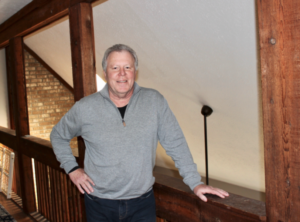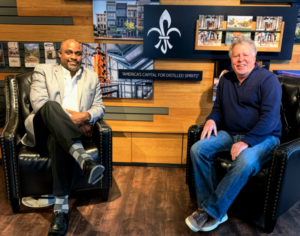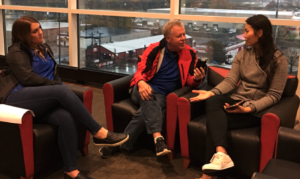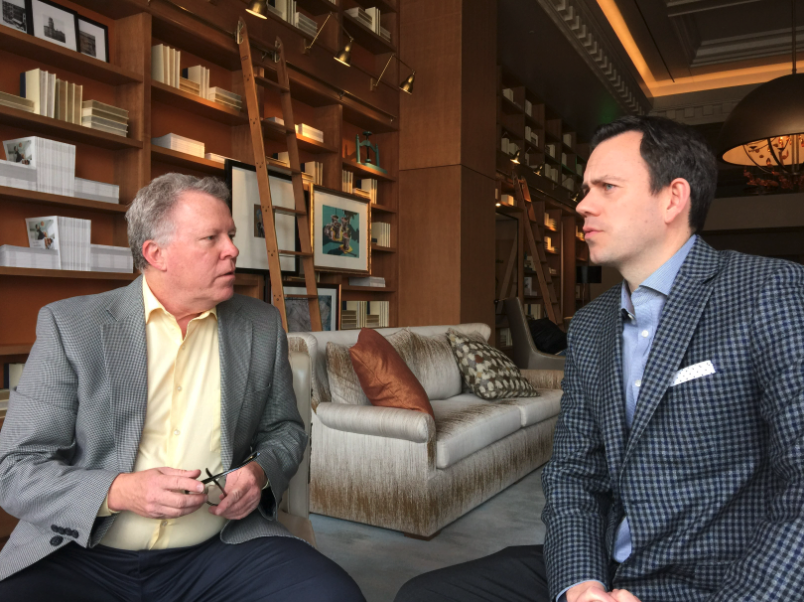Rick Redding’s “The Rusty Satellite Show” Podcast Reaches the Most Interesting People in the ’Ville
Photography Provided
 When a friend asked Rick Redding to run a podcast, Redding replied by asking what a podcast was. Don’t worry, Rick wasn’t out of touch. This conversation took place long before the word “podcast” was a household name.
When a friend asked Rick Redding to run a podcast, Redding replied by asking what a podcast was. Don’t worry, Rick wasn’t out of touch. This conversation took place long before the word “podcast” was a household name.
And that’s how Rick Redding, local blogger, got into the podcasting game and launched “The Rusty Satellite Show.” He did so under the condition that he would get a sponsor within a couple of months. After all, he wasn’t interested in having yet another hobby. Dan — the friend who’d recruited Redding to run the podcast — had headed a fundraiser campaign to raise the money for a studio and equipment. Passport swooped in as a sponsor, and Rick the former blogger was in business. Other sponsors stepped in and he kept going.
“One thing I’m good at is consistency,” Redding says. He sits at a table in the Biscuit Belly in the heart of Nulu, nursing a hot drink as a remedy from the first snow about to fall later that day. “This stuff today, it’s all self-imposed,” he says.
Although an appointment for an interview for his podcast has fallen through, Redding shrugs it off, saying that anything could happen in this business. Despite the unexpected gap in his schedule, he isn’t worried. That’s because he wasn’t going to have someone breathing down his neck asking why he doesn’t have a show up and running this week. “But I feel a responsibility to the sponsors, to myself, to put out a show every week,” he says. Luckily, he already had a meeting set up with mayoral hopeful David James, and Redding is looking forward to asking what makes him tick, and the big question, that is, why on earth would you want to be a mayor in today’s aggressive political climate?
A Louisville native, Redding was 36 years old when he started his first job as a reporter in 1996. He’d done freelance writing, like a lot of stuff having to do with sports. But at 36, he decided he wanted to make his mark writing for the media. He landed a job with “Business First” as a reporter, and it turned out, “I was pretty good at it,” he says. He wrote intriguing stories and won awards, and even though he only wrote three stories a week, none of it came without putting in the work. He kept track of who had the most front-page stories, and constantly stayed on top of the news. And that was his start in journalism.
When he was covering technology for “Business First” in 1999, the internet was a new thing that many hadn’t caught on to yet. “I remember going to my editor at ‘Business First’ saying, ‘There’s this thing on the internet called email, and we’ve got to have it.’” They resisted.
 His writing took him on a pinball ride through different jobs. He had done a story on a company called Iron Max. They needed somebody to do the kind of stuff he did, so they hired him. The company was locked inside the internet bubble, so he got to use email after all. Although it lasted only a year because the company dissolved, but he took another job at a place called NetWorld because he had done a story on them. He worked there for almost four years. “I’ve always had work, but I’ve never had a four-year anniversary at a job,” Redding says.
His writing took him on a pinball ride through different jobs. He had done a story on a company called Iron Max. They needed somebody to do the kind of stuff he did, so they hired him. The company was locked inside the internet bubble, so he got to use email after all. Although it lasted only a year because the company dissolved, but he took another job at a place called NetWorld because he had done a story on them. He worked there for almost four years. “I’ve always had work, but I’ve never had a four-year anniversary at a job,” Redding says.
After NetWorld, he tried entrepreneurship by becoming a freelance writer. The turning point came in late 2006. Someone he knew was working on a campaign for Bruce Lunsford who was running for governor. Redding jumped on the campaign, thinking they were going to win. Lunsford led most of the time up until May when the primaries were held, but Steve Beshear gained unexpected momentum and passed him up. Redding was sure he was heading for a long career in politics, but that disappeared when the campaign ended.
When he started blogging for ‘The Real Voice,’ it was the first online news blog in the city. “I put something out every day,” Redding says. Back then, everybody wanted to have a bog, but they didn’t want to put in the work to keep it up, but that’s exactly what Redding did, going so far as to make it a business. He did five or six posts a day, and in those days, that stood out above the rest. It was all he poured his time and energy into daily.
What did he blog about, exactly? What was his niche? He blogged about the news, mostly. He kept that up through most of 2007. He wrote about politics both local and state and everything that interested him in the city.
He used his connections from his previous employments, and since no one else was really into blogging yet, he received a lot of attention. “I would go out to a press conference at 3 and I would have it up on my blog at 4,” Redding says. “The new stations ignored their own websites,” he says. “They held it until 5 or 6, and the ‘Courier-Journal’ held it until the morning when the paper came out.” People who had access to the internet at work were reading the news on Redding’s blog, which is no longer available. “I was the predecessor,” he says. “I heard all these stories from people at the ‘Courier (-Journal)’ who said my site was on their monitors 24/7. ‘The Real Voice’ was the first place you looked. I just fell into it.” The blog ended in 2009.
What was the next obvious step from blogging once that platform had run its course? Podcasting, of course. His friend Dan had been impressed with Redding’s blog and came to him asking if he’d like to do this new thing called podcasting. Redding’s idea was to interview the most interesting people from the ‘Ville, keep it general, and make it all about the guests who come onto the show. From the start, the guest list has consisted of politicians, entrepreneurs, artists, folks from the non-profit world — just about anyone who grabs Redding’s attention. Either way, he tries to keep the pot diverse. If he’s had on three chefs in a row, he’ll reach out to an athlete or someone from a different industry to keep things fresh.
When Dan moved on about a year ago, Redding bought the business from him. Up until the second week of the COVID-19 pandemic — sometime in March of last year — Redding had put out a podcast every week (approximately 300 consecutive weeks).
But when the world stopped, the podcast did likewise. “The pandemic affected everyone in different ways,” Redding says. He recalls how no one wanted to go anywhere or see anyone. “The world stopped. I felt like I had to stop, too.” But after eight weeks of static, he asked himself why he wasn’t still doing the podcast, so he picked himself back up, along with his show.
 What makes him tick? “Even going back to the days of being a reporter, I like interviewing people, I like asking people what makes them tick,” he says.
What makes him tick? “Even going back to the days of being a reporter, I like interviewing people, I like asking people what makes them tick,” he says.
Redding says he likes to draw people out and make them say things that the audience would want to hear. “I do it because I like to do interviews, I do it because I like for people to know that that’s what I do,” he says. “That they think of me as the guy who created ‘The Rusty Satellite Show’ out of nothing.”
He says he feels a sense of accomplishment when he hears people like the mayor refer to “The Rusty Satellite Show.” “It’s kind of weird, but unique and interesting,” Redding says. “In my imagination, I think of a typical listener thinking, ‘I wonder who Rick’s going to have on the show this week?’ And if there’s people who think that, then that’s a reward too.”
The name Rusty Satellite, by the way, came about by his oldest son who, in middle school, created a comic strip character named Rusty Satellite. Redding liked the name so much he told his son that he’d like to use it someday for something. That something turned out to be for Louisville’s longest-running podcast.
And what are Redding’s aspirations for The Rusty Satellite Show going forward? He would like to host a localized version of “The Daily.” But of course, that’s a high hope. But having run a successful blog and a podcast, all centered around this little ol’ ’Ville, that’s not a bad thing to have on your resume. So, if you get a call from Redding and he wants to talk to you, just know that you’ve done something great to catch his eye, and many more will be exposed to you and your work as well.







Comments 1